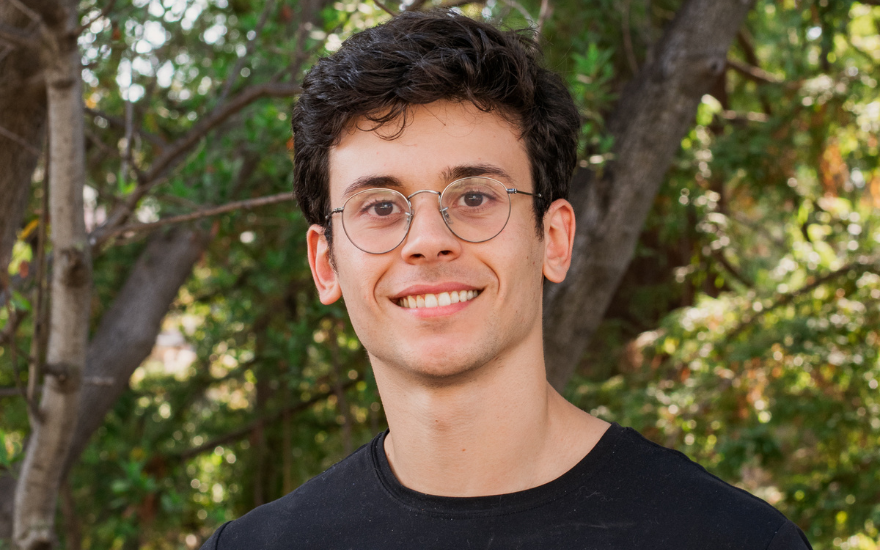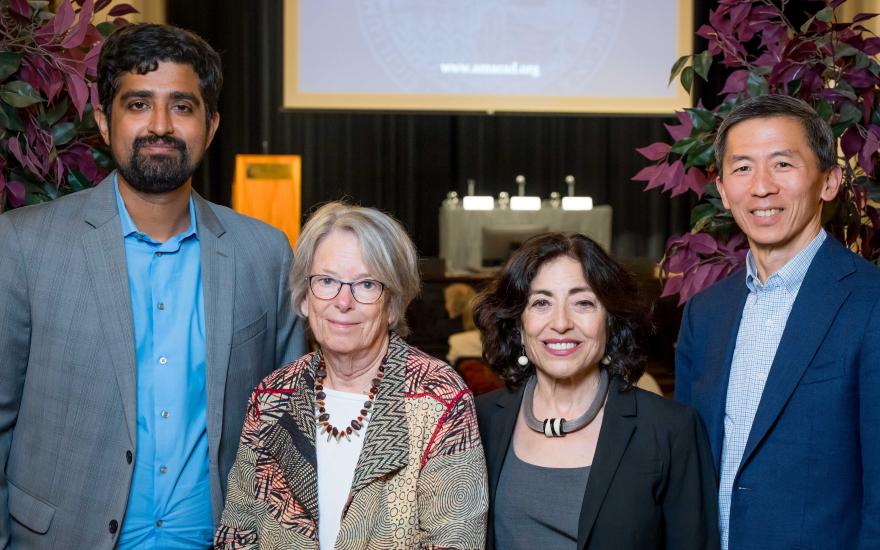When Sana Pandey arrived at UC Berkeley four years ago, she wanted to be a doctor. It was how she was going to put the most good into the world, she said. But after she took her first computer science class, the joy of problem solving had her hooked.
Now, Pandey sees the potential to help people at scale. She aims to develop AI systems that reflect and enable the best version of society – one that is diverse, engaged, equipped with credible information and open to listening to and learning from one another.
“I realized with time that computer science, and specifically AI, has this potential that we're just starting to tap into now to shape the way that our world exists and how we interact within it,” said Pandey, who is graduating this spring with data science and cognitive science degrees. AI “is going to either reinforce or completely upend the status quos and paradigms of our society.”
Artificial intelligence is already rapidly changing everything from how we do our jobs to how we receive information. News outlets are calling this period an “AI gold rush.” At this pivotal moment, Pandey is an example of the Berkeley-educated, future technology leaders joining the workforce who can help foster responsible AI developed in the public’s interest.
Pandey isn’t wasting time translating her education into impact. In August, she will join a startup run by a Berkeley alum that harnesses and hones AI as a tool to guide and support human intelligence rather than replacing it. She’s excited to work on projects like auditing the accuracy and outcomes of a city’s AI-fueled traffic ticketing system.
“It's very easy to say, ‘Oh, we're correctly identifying X number of tickets per day,’ and use that as a metric. But I think it's more valuable to instead ask, ‘As a result of the system, has our society as a whole benefited? Are we, in general, seeing safer streets?’” said the San Jose, Calif., native. “It’s a far more complex question, but also a far more rewarding one to get right.”
She feels prepared for this next step. Attending Berkeley has been like entering “a candy shop for anyone who's intellectually curious,” Pandey said. She’s been grateful to find mentors who are leading thinkers and who “really pushed me to make my presence felt in a field that historically has not seen people like me often.”
They encouraged her to take challenging courses and join the Berkeley AI Research Lab, a world-renowned group. She’s finishing up research this summer with her mentor, Jonathan Stray, focused on labeling good and bad conflict for recommender systems used on social media and other platforms. That means differentiating between trading insults online, for example, and a respectful debate.
“If we're able to limit the spread of ‘bad conflict’ content, while still encouraging genuinely positive discourse in society, I'm hoping that the level of information literacy and the level of critical thinking that goes into media consumption will rise and bring about a shift in those misinformation-polarization metrics that we see harming people today,” said Pandey.
Pandey is bringing value to the AI field through more than her technical excellence. She’s also often been the first or only woman of color in technology spaces and knows sharing her own experiences and insights are crucial to making better, more inclusive AI.
Women and people of color are already underrepresented in or disproportionately harmed by existing data and information that underpin AI systems. They’re often also not in the rooms where the technology is being designed, Pandey said. That means conversations around fundamental issues – from ranking social posts to the lack of data around women’s medical histories – miss crucial perspectives.
“People have the best intentions, but having people represent their own perspectives versus thinking about marginalized groups in an abstract way when having those discussions are two very, very different things,” said Pandey. “Having people who understand cultural and social aspects of those conversations can enrich that conversation much further.”
Still, being the woman of color in those rooms can be a challenge. Pandey remembers walking into her first internship at a startup freshman year to discover the women’s restroom didn’t have running water. There had been budget cuts and no women on staff.
Before she joined, there was no direct harm, and the startup turned the water on within a few days. But for that brief period, every time she went to the bathroom – meaning every time she announced she’d be using the men’s room, so could folks please not go in – it was a reminder that she herself was a first and only.
Today, she can laugh about it. She shares this and her other experiences with younger women and people of color who contact her to follow in her footsteps. But looking forward, she hopes to make a difference in diversifying who’s working in her own communities, too.
“There's research that shows that when there's only one person of a minority in a room, it's almost as if they're not there in the first place because there's no encouragement for them to participate, to speak up,” said Pandey. “I'm pushing to not just be the first woman in the room, but maybe to have two of us. Two of us would be great.”




